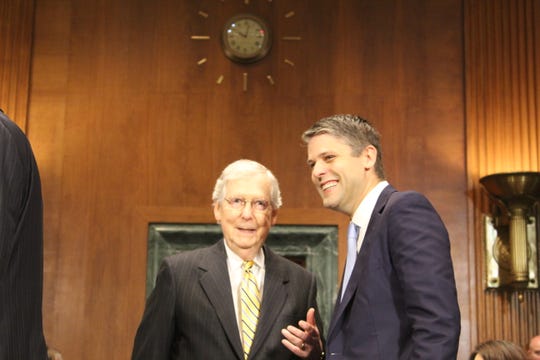DC Appeals Court Nominee Sails Through Confirmation Hearing Amid Pandemic Rancor

Judge Justin Walker, as expected, breezed through his confirmation hearing Wednesday for a spot on an influential appeals court in Washington, even as Democrats pressed him on previous comments about his judicial approach and his criticism of rulings that upheld the 2010 health care law.
The hearing turned into a proxy fight over Senate Majority Leader Mitch McConnell’s legislative priorities during the ongoing COVID-19 outbreak, including the race to fill federal judicial vacancies with President Donald Trump’s appointments.
The physical backdrop for that fight was one of the largest Senate hearing rooms, allowing senators and staff to practice social distancing and five committee members to appear on monitors. Walker donned a face mask before the hearing started.
Sen. Richard J. Durbin of Illinois was among several committee Democrats who criticized McConnell for bringing the Senate back to Washington not for legislation to respond to the health crisis but for the hearing for Walker.
That is particularly true, the Democrats said, for a nominee who said the Supreme Court made an “indefensible decision” to uphold the 2010 health care law known as the Affordable Care Act that many now depend on to have insurance.
“Why, in the middle of a pandemic, should we support a nominee who would take away health care from millions of Americans, including those with preexisting conditions?” said Sen. Dianne Feinstein of California, the committee’s top Democrat.
The 37-year-old McConnell protégé became a district court judge in the majority leader’s home state of Kentucky only a few months before Trump picked him to fill a vacancy on the U.S. Court of Appeals for the District of Columbia Circuit. That spot won’t actually be open until a judge officially retires in September, Democrats pointed out.
Walker, under questioning from Chairman Lindsey Graham of South Carolina, said comments he made about that Supreme Court decision as recently as his investiture ceremony in March were a “lighthearted allusion” and a “tongue-in-cheek” reference to the justices who dissented in that divisive 5-4 decision.
One of those dissenters was Justice Anthony M. Kennedy, for whom Walker clerked at the time of that 2012 decision. Walker also said he wrote about the health care law as an academic, that criticism of a legal decision is not about any health care policy, and that as a judge he would follow the decision as binding precedent.
But Durbin, during his questioning, described Walker’s comments as mocking the Supreme Court ruling and called it “painful” to hear Walker say he has an open mind on the issue.
“You have not been the least bit impartial when it comes to the Affordable Care Act. Your legal or, slash, constitutional contempt is obvious,” Durbin told Walker. “At your own ceremonial investiture, with a Supreme Court justice standing by you, you mocked it.”
And Sen. Patrick J. Leahy of Vermont was among Democrats who quizzed Walker on other comments at that investiture ceremony in March. Among them, Walker had alluded to 2016 Democratic presidential nominee Hillary Clinton’s oft-referenced remarks that half of Trump’s supporters belong in a “basket of deplorables.”
Walker said at the time: “Thank you for serving as an enduring reminder that although my legal principles are prevalent, they have not yet prevailed, and although we are winning we have not won. And that although we celebrate today, we cannot take for granted tomorrow, or we will lose our courts and our country to critics who call us terrifying and who describe us as deplorable.”
Walker told the committee that he was describing how his approach to the law would keep the judicial branch independent of politics, because a judge has a responsibility and a duty to go where the law and Constitution lead.
“I wasn’t trying to inject politics into my speech, I was trying to push back against the politicization of the judiciary,” Walker said.
Leahy, appearing via video, did not sound impressed.
“Well, judge, you’re under oath, so I’ll take that as your answer,” Leahy said. “I’ll also note the statements you’ve made follow the Republican agenda and what Donald Trump wants to see in his nominees, and you can understand why some, including a number of Republican judges, feel that it was more of an audition statement.”
But none of those shots appeared to land. No committee Republicans gave any hint that they would not back Walker or cross the majority leader, who holds great sway over the fate of their efforts on other policy issues.
And with a 53-47 advantage for Republicans in the full Senate, Democrats are powerless to stop his confirmation without the help of at least four Republicans.
McConnell, on the Senate floor during the hearing, reiterated the importance of Senate work during the pandemic. That included holding committee hearings and his commitment to move Walker’s confirmation quickly.
“I urge the committee to approve his nomination, and I look forward to voting to confirm him soon on the Senate floor,” McConnell said.
To Read The Full Story
Are you already a subscriber?
Click "Sign In" to log in!

Become a Web Subscriber
Click “Subscribe” below to begin the process of becoming a new subscriber.

Become a Print + Web Subscriber
Click “Subscribe” below to begin the process of becoming a new subscriber.

Renew Print + Web Subscription
Click “Renew Subscription” below to begin the process of renewing your subscription.





